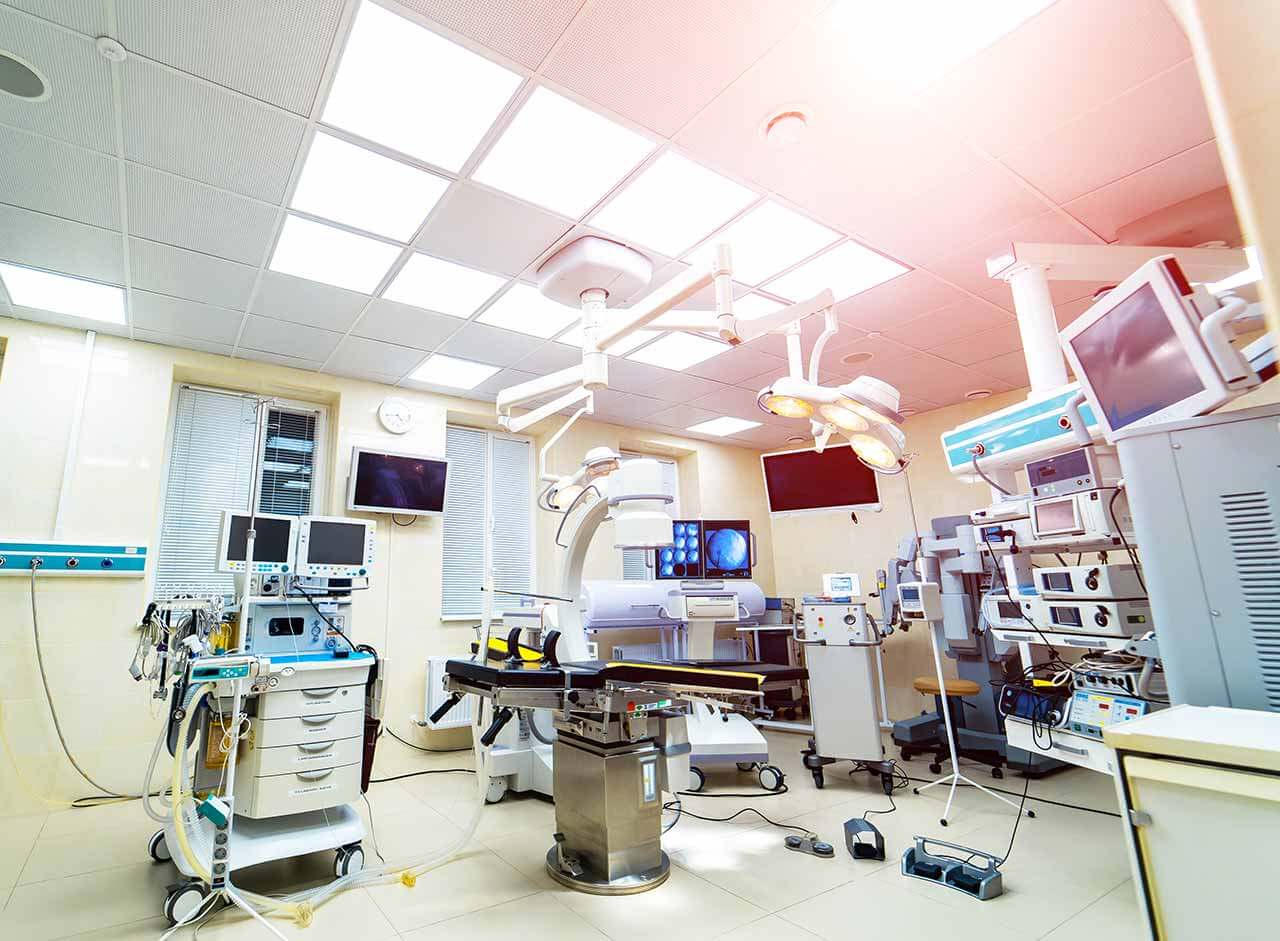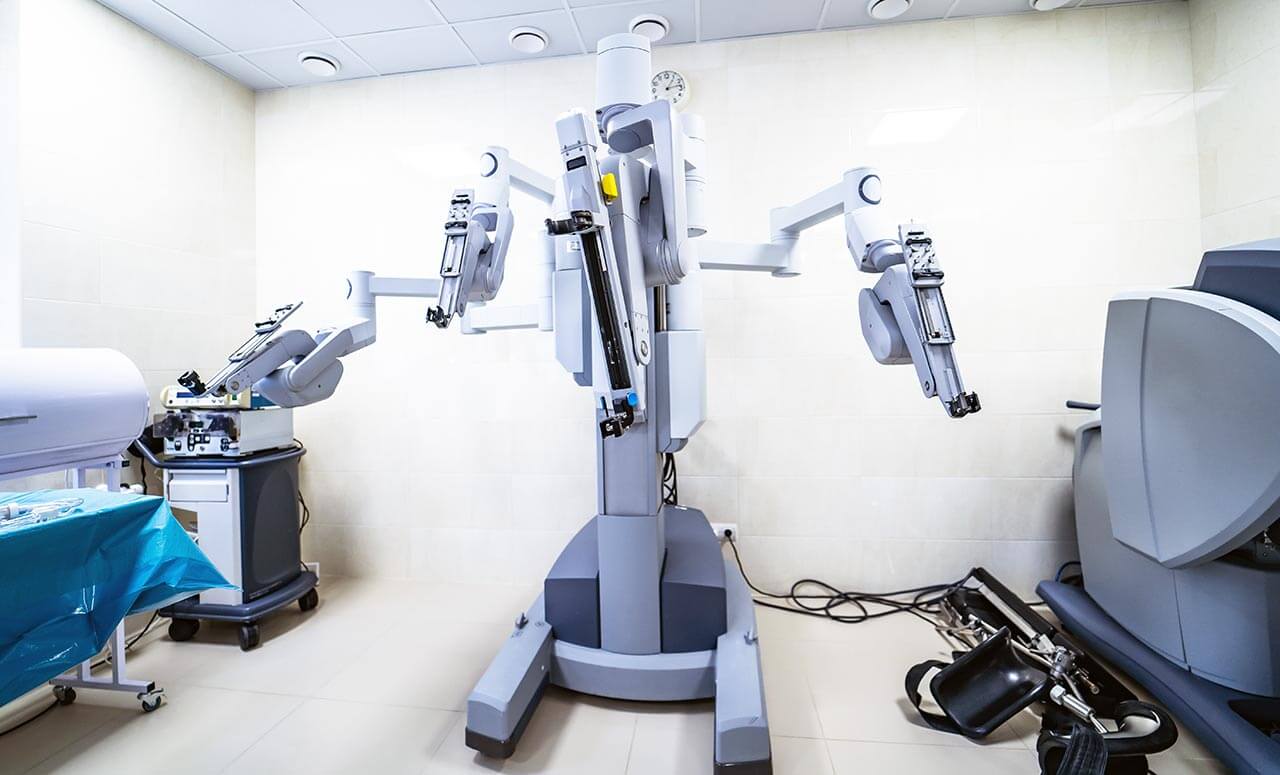
The program includes:
- Initial presentation in the clinic
- clinical history taking
- review of medical records
- physical examination
- laboratory tests:
- complete blood count
- general urine analysis
- biochemical analysis of blood
- TSH-basal, fT3, fT4
- tumor markers
- inflammation indicators (CRP, ESR)
- indicators of blood coagulation
- abdominal ultrasound scan
- CT scan/MRI or PET-CT of abdomen
- preoperative care
- cytoreductive surgery to remove visible tumors
inside the abdomen and HIPEC - histological and immunohistochemical
examination of removed tissues - symptomatic treatment
- cost of essential medicines
- nursing services
- stay in the hospital with a full board
- accommodation in a 2-bedroom ward
- elaboration of further recommendations
How program is carried out
During the first visit, the physician will conduct a clinical examination and go through the results of the available diagnostic tests. After that, you will undergo the necessary additional examination, such as the assessment of liver and kidney function, ultrasound scan and tomography of the abdominal organs. Based on the results of the examination, the physician will choose the surgical technique and the type of anesthesia. After that, preparation according to the preoperative standard will start.
Cytoreductive surgery begins with general anesthesia. The intervention is performed as open surgery, i.e. through the incision in the anterior abdominal wall, so that the surgeon can carefully examine the peritoneum and the surface of the abdominal organs. The surgeon removes affected by the malignant process ovaries, areas of the peritoneum and metastases in other internal organs. This stage of the operation can take several hours, since the overall effectiveness of the treatment depends on the completeness of the malignant tissues removal.
At the next stage of the operation, the surgeon inserts several catheters into the abdominal cavity. Through the catheters, a heated solution of a chemotherapy drug is pumped inside. The special system maintains the required temperature (42-43 degrees Celsius), pressure and circulation rate of the medicinal solution. The solution mechanically flushes out blood clots and remnants of malignant tissues, and a heated chemotherapy drug destroys micrometastases in internal organs and lymph nodes (micrometastases can’t be detected by the naked eye).
After 1-1.5 hours, the chemotherapy drug is removed from the abdominal cavity and the abdominal cavity is washed with saline. After that, the surgeon removes the catheters and sutures the incision of the anterior abdominal wall.
After the completion of the operation, you will be transferred to the ward of the intensive care unit, under the round-the-clock supervision of doctors and nurses. In 1-3 days after the operation, your drains will be removed and you will be transferred to a regular ward for further recovery. The whole treatment takes 10-12 days on average.
Finally, the attending physician will evaluate the results of control examinations, schedule the date of discharge from the hospital and give you detailed recommendations for further follow-up and treatment.
Required documents
- Medical records
- MRI/CT scan (not older than 3 months)
- Biopsy results (if available)
Service
You may also book:
 BookingHealth Price from:
BookingHealth Price from:
About the department
The Department of Obstetrics and Gynecology at the Rambam Health Care Campus Haifa offers the most advanced methods for the diagnostics and treatment of diseases of the female reproductive organs. The experienced obstetricians of the department provide optimal monitoring of the pregnancy, including high-risk pregnancies, safe childbirth and delicate postpartum care. The department has 90 beds, as well as 6 specialized sections and research laboratories. In addition, the department operates the In Vitro Fertilization Center, whose specialists often manage to fulfill the cherished dream of women – to become a mother. The department is headed by Prof. Dr. med. Amit Amnon.
The department includes the Section of Endoscopic Surgery, the Section of Gynecologic Oncology, the Section of Ultrasound Diagnostics and the Sperm Bank. In addition, the department houses the Section of Emergency Care, which has an operating room. The operating room is equipped with everything necessary for all gynecological procedures, including laparoscopic and hysteroscopic surgery, open surgical procedures and specialized procedures (for example, vaginal rejuvenation, pelvic floor reconstruction, etc.). It is worth noting that almost all operations are laparoscopic, which significantly reduces a hospitalization period, the risk of infection and pain.
In addition to the provision of high-quality medical care, the team of the department's doctors is actively involved in numerous research works in the area of their specialization. Particular attention should be given to the research on medical abortion during the first and second trimesters, as well as the early diagnostics of asymptomatic deep vein thrombosis in women undergoing chemotherapy.
Of special interest to the department's specialists is the detection and treatment of cancer lesions of the female reproductive organs. It offers the very latest methods for the diagnostics and treatment of malignant diseases of the uterus, ovaries, fallopian tubes, vagina and vulva. The doctors use unique methods of surgical and comprehensive treatment in order to achieve a high level of survival even in metastatic cancer. The doctors also make every effort to preserve reproductive function in women after the operation to treat cancer. The department's medical staff ensures the high-quality medical services and provides patients with psychological support.
The experts in the field of in vitro fertilization have long experience in this procedure. The department performs numerous diagnostic and therapeutic manipulations, which aim to determine the causes of infertility and eliminate problems with conception and pregnancy preservation. The department is the only Israeli medical facility where IVF is performed for women with hepatitis or AIDS, as well as for carriers of the hepatitis or HIV.
The team of the department's obstetricians is responsible for the comprehensive prenatal diagnostics, high-quality pregnancy management, postpartum care for both mother and baby. Childbirth takes place in the modern delivery rooms, which are equipped with everything necessary for a successful childbirth. The department's doctors strictly meet the treatment protocols and standards, due to which ensure high-quality medical service.
The main activities of the department include:
- Gynecology
- Early diagnostics and treatment of precancerous diseases of the cervix, vagina and vulva
- Cervical smear test (PAP-test)
- Diagnostics and treatment of haemorrhages after intercourse and violations of the regularity of the ovarian menstrual cycle
- Treatment of condylomas in women and men
- Diagnostics and treatment of dermatological and infectious lesions of the vulva and labia
- Diagnostics and treatment of chronic vaginal inflammations
- Diagnostics and treatment of vestibulitis (pain, which occurs during intercourse at the time of introduction of the penis into the vagina)
- Diagnostics and treatment of urinary tract inflammations
- Diagnostics and conservative treatment of uterine fibroids by means of embolization
- Hysteroscopic surgery
- Laparoscopic surgery to remove the uterus, ovaries or cysts of the reproductive organs
- Surgery to correct the uterine and vaginal prolapse
- Electric cervical conization
- Polyp removal
- Robot-assisted surgery (da Vinci surgical system)
- Obstetrics
- Ultrasound diagnostics
- Screening during the first and second trimesters
- Ultrasound examinations of the congenital malformations
- Fetal echocardiography
- Amniotic fluid testing
- Chorionic villus sampling
- Umbilical cord testing for diagnostic and therapeutic purposes
- Partial-birth abortion
- Treatment of ectopic pregnancy
- Medical abortion
- Surgical abortion (curettage)
- Childbirth
- Postpartum care
- Ultrasound diagnostics
- In vitro fertilization (within the specialized center)
- Other medical services
Curriculum vitae
Education
- 1989 Graduated with honors from the Faculty of Medicine at the Technion – Israel Institute of Technology, Haifa, Israel, and became Doctor of Medicine.
Specialization
- Internship in Obstetrics and Gynecology at the Emek Medical Center.
- 1998 - 2000 Advanced training in Female Cancers at the Baylor College of Medicine, Houston, Texas.
Clinical Career
- Currently, Dr. Amit Amnon is the Chief Physician of the Department of Obstetrics and Gynecology at the Rambam Health Care Campus Haifa.
- 2006 - 2014 Head of the Section of Gynecologic Oncology at the Rambam Health Care Campus Haifa.
- He held leading clinical positions, and was also the Leading Specialist and Consultant of major Maccabi and Clalit Health Care Services in Israel.
Research Focuses
- Development of modern techniques and diagnostic criteria for ultrasound examination in gynecology.
- Improvement of computed and positron emission tomography protocols.
- Examination of the effects of chemotherapy and radiation therapy on the patients with cervical cancer.
- Diagnostics, treatment and prevention of thrombotic complications in patients with malignant neoplasms of the female reproductive organs.
- Rehabilitation and improvement of the quality of life after cancers.
- Research in the field of new drug therapy protocols for ovarian cancer.
Teaching Career and Publications
- Since 2001 and to the present day, Dr. Amit Amnon has been Leading Lecturer in the Department of Gynecology, Faculty of Medicine, Technion – Israel Institute of Technology, as well as the Faculty of Nursing. He was repeatedly recognized as the Best Lecturer of the Year.
- The author of numerous works, scientific publications and researches in the field of diagnostics and treatment of malignant tumors.
Memberships in Professional Societies
- Israeli Board of Gynecologists.
- American College of Gynecologic Oncologists.
- European Society of Gynecology.
- International College of Oncologists.
Photo of the doctor: (c) Rambam Health Care Campus Haifa
About hospital
The Rambam Health Care Campus Haifa is the largest and the most progressive hospital in Northern Israel. The medical center was founded in 1938 and nowadays is proud of its long history, rich and successful experience in providing comprehensive medical services in all medical fields. The hospital serves more than 2 million locals, as well as the members of the Israel Defense Forces, UN Peacekeeping Forces and the United States Sixth Fleet. The medical center houses 61 inpatient departments, 73 specialized departments, 10 medical institutes and 25 laboratories. It is also the clinical and academic base of the Technion – Israel Institute of Technology.
The medical center includes the Ruth Rappaport Children's Hospital. It is a multidisciplinary medical facility specializing in the diagnostics and treatment of various pathologies, including extremely rare ones, in children of all age groups.
The total number of employees in the medical facility is 4,000 (715 doctors and 1,407 nurses). Many doctors are world-famous in the field of their clinical specialty and participate in advanced research projects in order to offer new treatment methods not only to their patients, but also to the world community.
The medical center is a leader in the field of medical care in emergency cases with a large number of victims. In addition, the hospital is certified in accordance with the strict standards of the Joint Commission International (JCI).
During the long-term and successful clinical practice, the medical center has formed a clear vision of optimal medical support and system of values. These suggest that the primary focus is always on the patient with his individual needs and wishes, while the medical services are professional, high-quality and safe. In addition, the specialists of the hospital apply the most effective and innovative treatment methods, as well as create a favorable environment, which contributes to the improvement of physical and emotional health and well-being of the patient. The key role in the daily work of the hospital is also played by a tolerant attitude towards all patients.
Photo: (c) depositphotos
Accommodation in hospital
Patients rooms
The patients of the Rambam Health Care Campus Haifa live in comfortable rooms designed in light colors. The standard room includes an automatically adjustable bed, a bedside table, a wardrobe for storing clothes, an armchair and chairs for receiving visitors, a TV, a telephone. Each room is equipped with an ensuite bathroom with shower and toilet.
Meals and Menus
The patients of the hospital are offered tasty and balanced three meals a day: breakfast, lunch and dinner. The menu also includes dietary and vegetarian dishes.
Further details
Standard rooms include:





